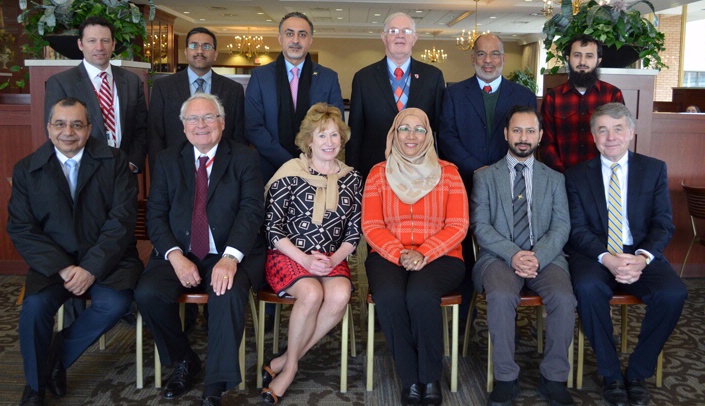A delegation representing the Oman Cancer Association, a non-governmental organization registered with the Oman Ministry of Social Development, is visiting the medical center this week to discuss joint opportunities for collaboration.
The collaboration is designed to establish a humanitarian program in cancer prevention, diagnosis and control in the form of the International Cancer Prevention Consortium (ICPC), a joint partnership under development by UNMC, the Fred & Pamela Buffett Cancer Center and the Oman Cancer Association.
The goal of the meetings has been to develop collaborative programs in research, training, and capacity building in biomedical sciences and cancer prevention and control.
UNMC hosts have been Amr Soliman, M.D., Ph.D., professor and chair of epidemiology in the College of Public Health, Ken Cowan, M.D., Ph.D., director of the Fred & Pamela Buffett Cancer Center and the Eppley Institute for Research in Cancer, and Ward Chambers, M.D., executive director, international health and medical education, College of Public Health.
The Oman delegation included Dr. Wahid Al Kharusi, a retired orthopaedic and trauma surgeon who is serving as secretary general in the Oman Cancer Association and ambassador at the Ministry of Foreign Affairs of Oman; Yuthar Mohammed Al Rawahy, president, founder and chairperson of the Oman Cancer Association; and Dr. Talal Al-Balushi, cultural attache’ at the Embassy of the Sultanate of Oman – Cultural Division.
The Cultural Division facilitates educational partnerships and student exchanges between Omani institutions and higher education institutions in the U.S. and Canada.
Oman is an Arab country of about 4.3 million people. It is located on the southeastern coast of the Arabian Peninsula and is bordered by the United Arab Emirates, Saudi Arabia and Yemen.
In 2010, the United Nations Development Programme ranked Oman as the most improved nation in the world in terms of development during the preceding 40 years. Unlike other Arab countries, Oman’s economy is not solely dependent on the oil industry. A significant portion of its economy is tourism and trade of fish, dates, and certain agricultural produce.
